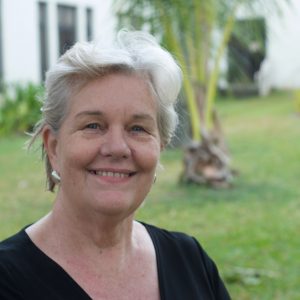Gay Garland Reed

"Shaped by International Experience"
Department
Educational Foundations
Related Degrees
- PhD, Education: Educational Foundations
Describe your road to becoming an educator?
It started when I was a 22-year old Peace Corp volunteer in Korea. That experience was a life-changing event; the Peace Corps turned me into a teacher. I stayed in Korea for 6 years (5 with the Peace Corps), teaching English at Sogang University. I was also an ESL teacher in Iran from 1976-1978 and later in Abu Dhabi, UAE where my second child was born.
I didn’t decide to pursue my master’s and doctorate until after my kids were older. My passion was to go to China and our family had the opportunity in 1987-88. Later we took the Trans Siberian railroad through the former USSR in 1990, then entered China from the northeastern border. That was the return trip when I was doing dissertation research on Chinese moral and political education.
How did you choose Hawai‘i?
I guess you might say that Hawai‘i chose me. At that time (1992), there were a number of Chinese students in our department (Educational Foundations) and they needed faculty who had experience with Chinese education. It turned out to be a perfect fit because I think of myself as an “in-between” person–between American and East Asian cultures. Hawai‘i is a perfect place to be because it also is in-between, both geographically and to some extent culturally.
Reflect on being an In-Between person?
I think I’ve cultivated the sensibilities of an in-between person because of living in so many different places and seeing things from so many different perspectives. Culture is so important to me–interacting, teaching and learning; it’s all endlessly fascinating.
Being an in-between person gives me multiple lenses for looking at the world. It also allows you to reflect on your own culture, appreciate that other cultures have developed ways of doing things, and interact with people who have a long history and important insights about human interaction. Working with people from different backgrounds gives me a larger sense of what it means to be a human being.
That may be why teaching online has not worked for me. I like to say that I like to be able to smell my students–you need to have that presence in order to read them and to have a sense of how they are feeling about what you have to say. I need that interaction to be able to know if I’m engaging them. I’ve tried teaching online, but I think that all these years of working in other cultures, learning how to read people, however imperfectly, all of that gets lost without having their actual presence.
What are you interested in now?
I have written quite a bit about Korean and Chinese education. More and more, I’m becoming interested in mixed identities. I am exploring new ways of talking about complex identities. We don’t have a very sophisticated vocabulary to talk about diversity beyond the usual categories of gender, race and ethnicity. These really don’t have much meaning because they don’t tell us about a person’s uniqueness and diversity.
How do you hope to see your teaching and research benefit others?
I tend to think that people always benefit from a thoughtful and systematic look at culture and society–to understand the way others interpret the world and question their own assumptions. I hope that is what I can do, help my students and people who read my work to see things from a different perspective.
When I retire I would like to work with non-English speaking immigrants. It’s like returning to my roots, as an ESL teacher, perhaps working with older adults this time. This culture is a hard culture to learn and everything is turned upside down for them. People need to have cultural interpreters, to help them understand what they are experiencing. I think I’d also like to return to art.
